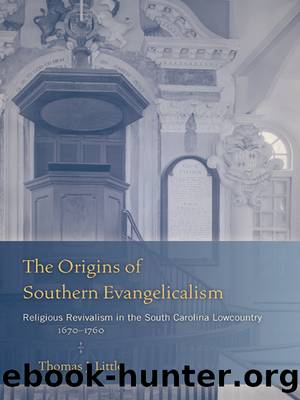The Origins of Southern Evangelicalism by Little Thomas J.;

Author:Little, Thomas J.;
Language: eng
Format: epub
Publisher: University of South Carolina Press
Published: 2013-08-15T00:00:00+00:00
In some ways Whitefieldâs trial encapsulized the tenuous position of the Church of England in the South Carolina lowcountry; in others it marked a turning point in the First Great Awakening. Although he failed in his secret attempt to make the established church independent of SPG subsidies in the 1730s, Alexander Garden did much to shore up its authority during his twelve-year tenure as commissaryâdisciplining immoral clergy and seeking to win influence with the provincial laity by making concessions relative to parish government, for example.82 Yet that authority was weak and did not extend to a majority of colonists. Despite the commissaryâs efforts, anticlerical sentiment remained strong, and puritanical nonconformity within the Church of England continued as before, a disposition which Garden was no more willing to tolerate than his predecessors had been, especially among parish clergy. Further, most men and women worshiped outside of South Carolinaâs established church; Protestant dissenters tainted it with an air of illegitimacy; and Anglican laypeople tended to favor a broader policy of toleration than their ministers, being notably pluralistic and latitudarian in their religious behavior.83
In one sense, then, Whitefieldâs trial was an example of a continuing problem with South Carolinaâs established state church, reflecting the tenuousness of its position and the fragility of its authority. Yet in exercising that authority Commissary Garden exacerbated the problem and badly damaged the Church of England, while at the same time emboldening Whitefield and his supporters. On the night after the judicial proceedings, Garden and Whitefield met one another and walked along a Charleston green near St. Philipâs. During the course of their conversation the commissary explained why he had brought the charges against Whitefield and implied that Whitefield knew âin his Conscience I was but doing my bounden Duty.â Indeed, carefully following his official instructions on how to proceed against irregular clergy, Garden first admonished Whitefield in private, then censured him from the pulpit, and then brought him up for trial. Claiming to be duty-bound, he knew that there were grave risks involved.84
First, Garden knew that he stood on shaky legal ground. Whitefield was licensed to preach in Georgia, technically outside of Gardenâs jurisdiction, and just a few years before Garden had written about a similar case involving an Anglican chaplain garrisoned at Port Royal, noting that he had been prevented by his commission from taking legal action against the badly behaved cleric. Second, the commissary realized that clerical support for his actions was soft. Presumably, he could count votes, that is, he could count on the support of his assistant, William Orr, a former Presbyterian, and the other three judicial assessors who sat with him at the trial. But opposition to the revivalist was by no means universal. Among the Anglican clergy were some who were sympathetic to Whitefield. Lewis Jones reportedly âdisapproved entirely of the Commissaryâs treatmentâ of Whitefield. In addition Whitefield noted that Thomas Thompson of St. Bartholomewâs Parish ârefused to preach or sit in judgment against me.â It is unlikely that Jones and Thompson were alone.
Download
This site does not store any files on its server. We only index and link to content provided by other sites. Please contact the content providers to delete copyright contents if any and email us, we'll remove relevant links or contents immediately.
Jesus Wars: How Four Patriarchs, Three Queens, and Two Emperors Decided What Christians Would Believe for the Next 1,500 Years by John Philip Jenkins(101)
The Writings of Henry Barrow, 1590-91 by Leland H. Carlson(100)
The Virgin by Ashe Geoffrey(96)
Dark mysteries of the vatican by H. Paul Jeffers(93)
Church, State and Dynasty in Renaissance Poland: The Career of Cardinal Fryderyk Jagiellon (1468-1503) by Natalia Nowakowska(90)
The Decline of Established Christianity in the Western World by Peterson Paul Silas(90)
The Rhetorical Leadership of Fulton J. Sheen, Norman Vincent Peale, and Billy Graham in the Age of Extremes by Sherwood Timothy H.;(86)
Crusaders, Cathars and the Holy Places by Hamilton Bernard;(85)
The Pietist Impulse in Christianity by Christian T. Collins Winn(78)
Intimacy and Exclusion by Dagmar Herzog(73)
The Origins of Southern Evangelicalism by Little Thomas J.;(73)
Holy Matter by Sara Ritchey(72)
In Discordance with the Scriptures: American Protestant Battles Over Translating the Bible (Religion in America) by Peter J. Thuesen(70)
A History of Liturgical Books by Palazzo Eric(67)
Parish Boundaries by John T. McGreevy(64)
Lonely Mystic : A New Portrait of Henri J. M. Nouwen by Michael Ford(61)
Rufinus of Aquileia: History of the Church by Rufus of Aquileia (Author) & Philip R. Amidon (Translator)(58)
The Eastern Churches Trilogy: The Orthodox Eastern Church by Adrian Fortescue(52)
Catholic Gentry in English Society: The Throckmortons of Coughton from Reformation to Emancipation by Peter Marshall Geoffrey Scott (eds.)(52)
